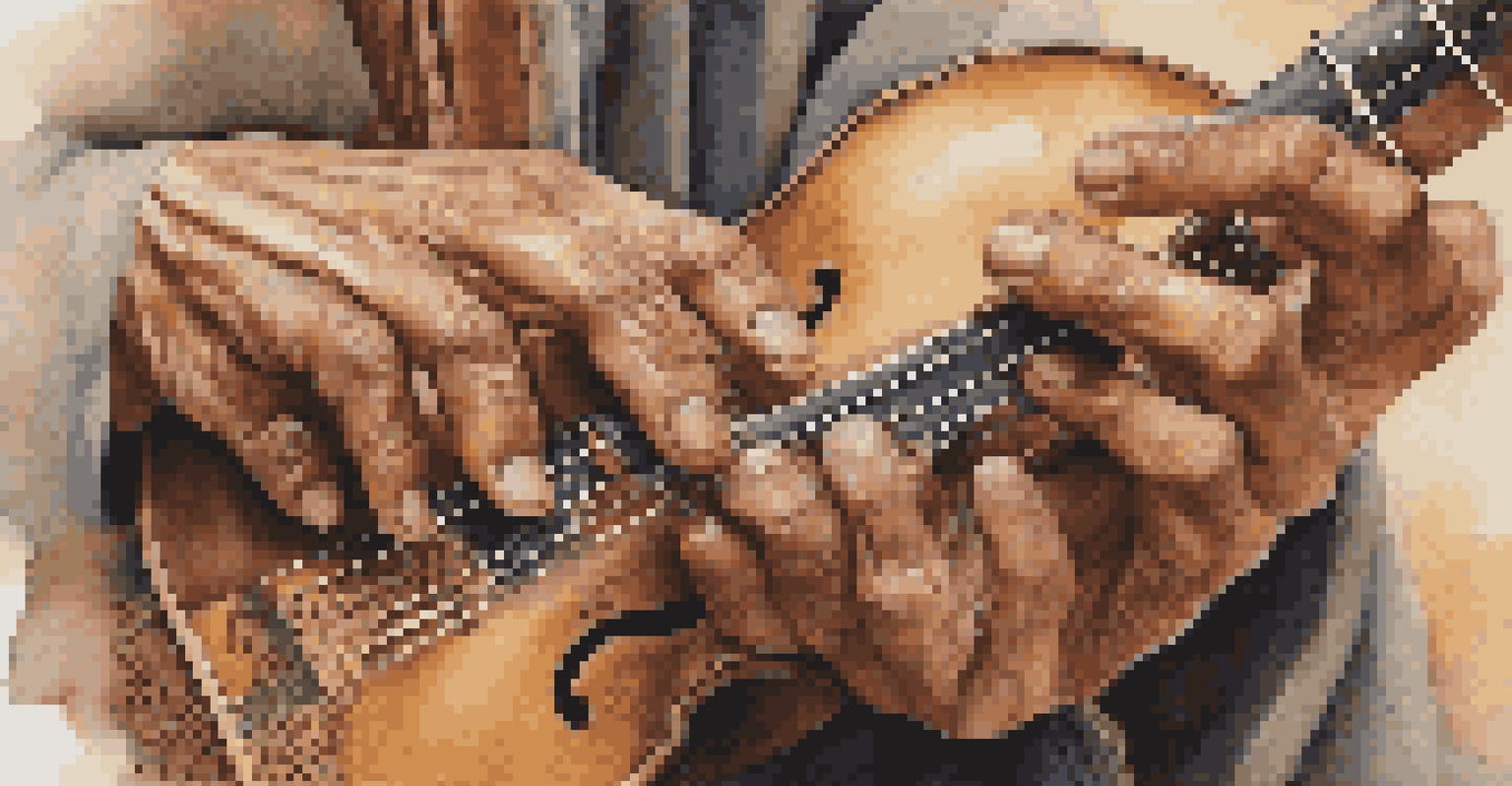Music Education and Its Role in Bridging Cultural Divides

The Importance of Music Education in Society
Music education serves as a vital part of our society, enriching lives and fostering creativity. It equips students with essential skills such as teamwork, discipline, and communication. By engaging with music, learners also develop a deeper appreciation for art and culture, which can enhance their overall educational experience.
Music can change the world because it can change people.
Moreover, music education can improve cognitive abilities, including memory and critical thinking. When students learn to read music or play an instrument, they engage both sides of their brains, promoting holistic development. This multifaceted approach to learning makes music education an invaluable component of a well-rounded curriculum.
In essence, music education lays a strong foundation for personal growth and societal cohesion. It not only nurtures individual talents but also cultivates a sense of community among diverse groups. As students collaborate on musical projects, they build bonds that transcend their differences.
How Music Connects Different Cultures
Music is a universal language that can bridge cultural divides, creating connections among people from various backgrounds. It often reflects the experiences, traditions, and values of different cultures, allowing individuals to share their stories and heritage. This shared experience fosters empathy and understanding, paving the way for meaningful conversations.

For instance, traditional songs can introduce students to the history and customs of different cultures, promoting a sense of curiosity and respect. When students perform or listen to music from diverse backgrounds, they gain insight into the emotions and narratives that shape those cultures. This exposure helps dismantle stereotypes and encourages openness.
Music Education Enhances Skills
Music education fosters essential skills such as teamwork, discipline, and communication while enriching students' appreciation for art and culture.
As students learn about various musical styles, they may also discover commonalities that unite them with others. Whether through folk songs, classical compositions, or contemporary genres, music reveals shared human experiences, reinforcing the idea that despite our differences, we all seek connection and belonging.
The Role of Music Education in Promoting Inclusivity
Music education can serve as a powerful tool for inclusivity, bringing together students from different cultural backgrounds. By creating a safe space for musical collaboration, educators can help students feel valued and respected. This sense of belonging can significantly impact their overall self-esteem and motivation to participate.
The beautiful thing about learning is that no one can take it away from you.
In inclusive music classrooms, teachers can encourage students to share their cultural music traditions, allowing for a rich exchange of ideas. This not only validates students' identities but also broadens the musical repertoire for everyone involved. When students see their culture represented, they are more likely to engage actively and contribute positively.
As a result, music education fosters an environment where diversity is celebrated rather than marginalized. Students learn to appreciate their peers' unique perspectives and experiences, which cultivates a sense of community. Ultimately, this inclusivity enriches the learning experience and encourages collaboration among students.
Case Studies: Successful Music Education Programs
Several successful music education programs around the world exemplify how music can bridge cultural divides. Programs like El Sistema in Venezuela provide access to music education for underprivileged children, fostering a sense of community and social responsibility. Through orchestras and ensembles, students from diverse backgrounds come together to create beautiful music while developing life skills.
Another notable example is the 'Music for All' initiative in the United States, which aims to promote inclusivity and diversity in music education. By providing resources and training for educators, the program supports the integration of diverse musical styles and traditions into school curricula. This ensures that students can explore and appreciate a wide range of cultural expressions.
Music Bridges Cultural Divides
As a universal language, music connects diverse cultures, promoting empathy and understanding through shared experiences.
These programs demonstrate that when students engage in music education, they not only hone their musical abilities but also learn the value of collaboration and respect for others. The positive impact of these initiatives can be seen in the lasting friendships and connections forged through shared musical experiences.
Overcoming Challenges in Music Education
Despite the numerous benefits, music education can face challenges in bridging cultural divides. Limited funding and resources often restrict access to quality music programs, particularly in underserved communities. When schools lack instruments or qualified instructors, students miss out on valuable opportunities for growth and connection.
Moreover, there can be resistance to including diverse musical traditions in music curricula. Some educators might prioritize classical music over other genres, inadvertently sidelining students' cultural backgrounds. To overcome this, it's essential for educators to embrace a more inclusive approach, recognizing the richness that various musical styles bring to the learning environment.
Addressing these challenges requires a commitment from educators, policymakers, and communities to advocate for music education. By working together, we can create more equitable access to music programs, ensuring that every student has the chance to explore and celebrate their culture through music.
The Future of Music Education and Cultural Exchange
As we look ahead, the future of music education presents exciting opportunities for cultural exchange. Technological advancements have made it easier than ever for students to connect with peers from around the globe. Virtual platforms can facilitate collaborative projects, allowing students to share their musical talents and cultural narratives regardless of their physical location.
Furthermore, incorporating world music into curricula can enrich students' understanding of global cultures. By exploring music from different regions, students can develop a broader perspective, fostering a sense of global citizenship. This awareness encourages them to appreciate the diversity that exists within our world.
Inclusivity Through Music Learning
Music education creates inclusive environments that celebrate diversity, allowing students to share their cultural traditions and build community.
Ultimately, the future of music education lies in embracing inclusivity and cultural exchange. By prioritizing diverse musical traditions and fostering connections among students, we can create a more harmonious and understanding society. Music has the power to unite us, and through education, we can ensure that this gift is shared by all.
Conclusion: Music as a Bridge to Understanding
In conclusion, music education plays a crucial role in bridging cultural divides by promoting understanding and inclusivity. Through the exploration of diverse musical traditions, students not only develop their musical skills but also learn valuable lessons about empathy and respect. The connections formed through music can transcend language and cultural barriers.
As educators and communities prioritize music education, they foster environments where diversity is celebrated and inclusivity thrives. By investing in these programs, we can empower future generations to embrace cultural differences and forge meaningful connections with one another.

Ultimately, music holds the potential to be a powerful bridge that unites us all. By nurturing a love for music in our schools, we can create a more harmonious world where understanding and appreciation for diverse cultures flourish.